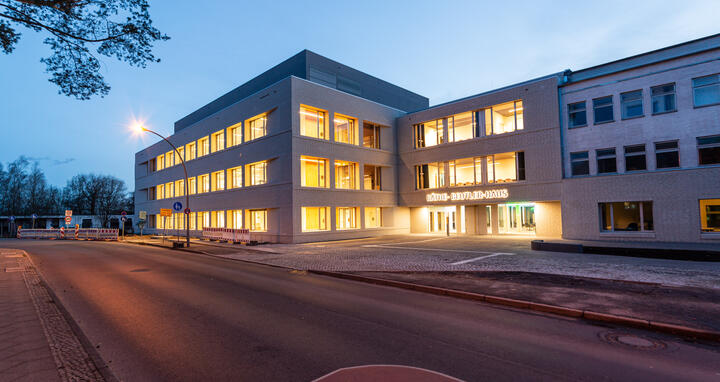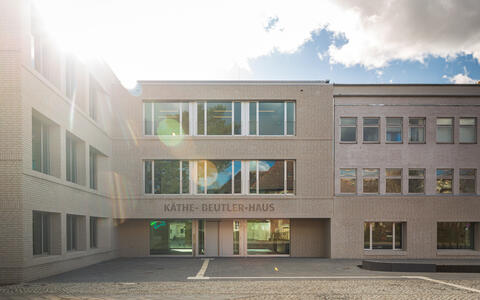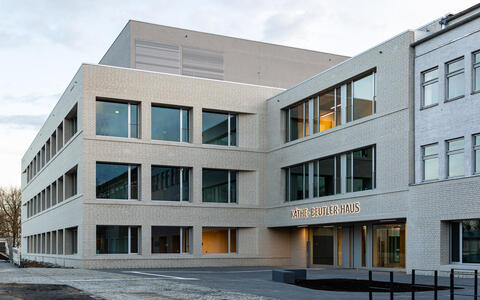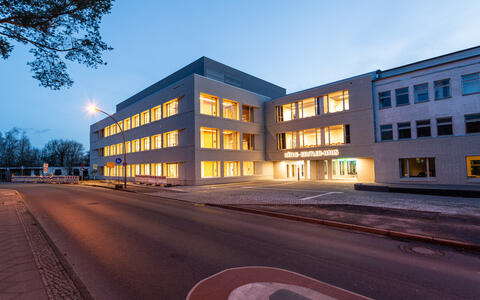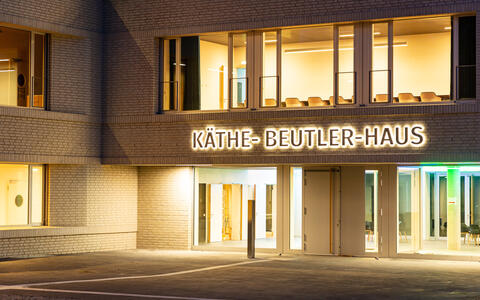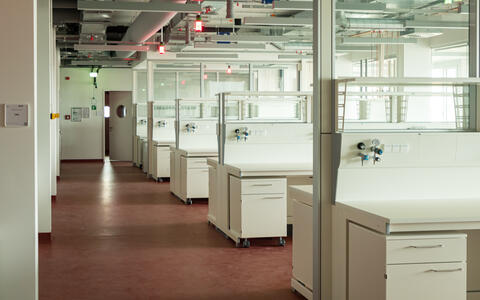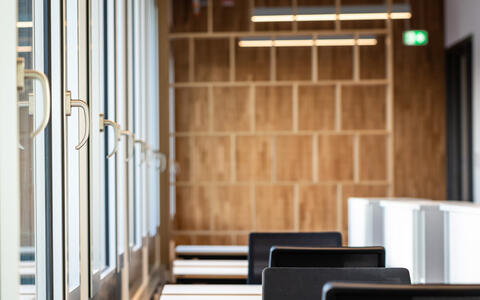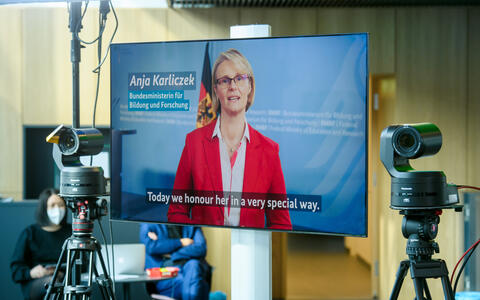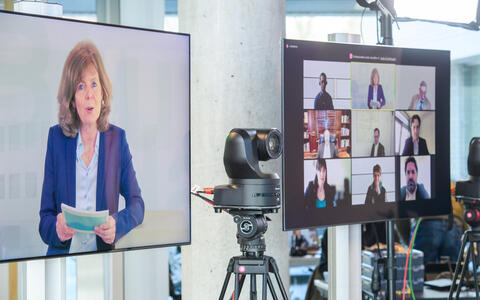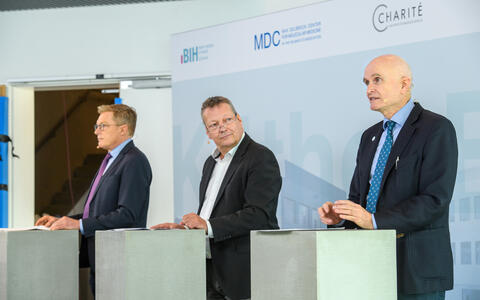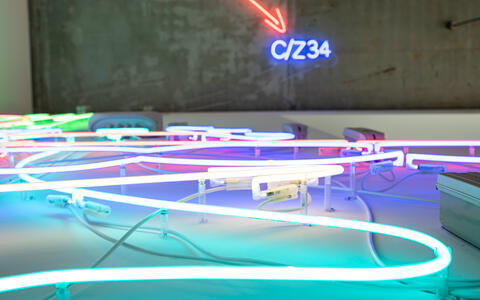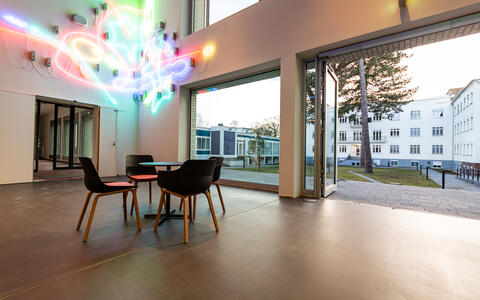📺 Grand opening of the Käthe Beutler Building
Federal Research Minister Anja Karliczek and Berlin’s Governing Mayor and Senator for Higher Education and Research Michael Müller inaugurated today a new building for translational medical research at the science, health and biotechnology park Campus Berlin Buch. The facility will be jointly run by the Berlin Institute of Health (BIH) at Charité and the Max Delbrück Center for Molecular Medicine in the Helmholtz Association (MDC). The federal government financed €26.2 million of the new building’s total cost of around €29 million. A former clinic facility that stood on the site has been renovated and expanded to create the new Käthe Beutler Building, which now provides 3,000 m2 of space where some 200 scientists will conduct research with a focus on vascular medicine. The name of the building commemorates Jewish doctor and scientist Käthe Beutler, who was forced to emigrate to the United States under the Nazis in 1935. Her son and grandson both gave speeches at the event, as did the Chairman of the Board of the Jewish Community of Berlin. The Käthe Beutler Building is the first BIH research building to go into operation.
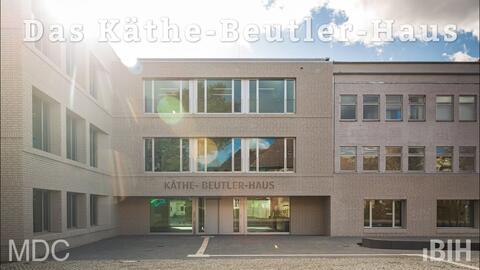
Käthe Beutler serves as a role model
“The new Käthe Beutler Building will further interconnect research activities in Berlin - both spatially and substantively. It creates a joint research site for the BIH and the MDC at the Buch campus. The namesake of the building, the pediatrician and researcher Dr. Käthe Beutler, exemplifies through her personal life story the traits of determination, perseverance and foresight. She thus serves as a role model today, especially for young female scientists, researchers and students. I wish the BIH and the MDC, all other participating research institutions and all future occupants of the Käthe Beutler Building every success and good fortune in their joint work,” said the Federal Research Minister Anja Karliczek on the occasion of the Käthe Beutler Building’s inauguration, where only a few guests were physically present due to Covid-19 restrictions.
Karliczek delivered her speech by video message, as did Berlin’s Governing Mayor and Senator for Higher Education and Research Michael Müller: “The Käthe Beutler Building plays an important bridging role in the Privileged Partnership between the MDC and the BIH at the Charité. Their joint research activities are of great importance to science, health policy and society, and now they have the ideal conditions in which to flourish. I am very grateful that with this special research building, Käthe Beutler’s name is returning to Berlin and will embody our growing medical metropolis.”

A first home of ist own for the BIH
Professor Christopher Baum, Chair of the BIH Board of Directors and Chief Translational Research Officer of Charité – Universitätsmedizin Berlin, is delighted with this first BIH building, which is now ready to be handed over to researchers. “Up to now, BIH research groups have been spread across various buildings all over Berlin. We are very pleased that the BIH now has a physical location and a first home of its own with the Käthe Beutler Building. In close partnership with the MDC, important research will take place here within the Focus Area ‘Translational Vascular Biomedicine.’ Blood vessels play a role in many diseases, so hopefully this work will soon benefit many patients.”
At the opening of the new building, where research groups from the MDC and BIH will work together under one roof, interim Scientific Director of the MDC Professor Thomas Sommer said: “I am delighted that we are opening the Käthe Beutler Building here on Campus Berlin Buch today – and, with it, strengthening our productive partnership with the BIH and Charité. For many years, MDC scientists have been working closely and successfully with physicians and clinical researchers in a variety of ways. The Experimental and Clinical Research Center of the MDC and Charité is just next door, and represents a wonderful example of successful patient-oriented research. Today, this successful model of translation (“from bench to bedside”) is being extended to include vascular research and medicine. I wish all those involved every success.”
The border between Berlin and Brandenburg runs through the middle of the Käthe Beutler Building. So it is fitting that this facility also bridges the border between basic research and clinical practice. Professor Axel R. Pries, Dean of Charité, considers this an essential aspect: “It is of the utmost importance that doctors, researchers and, not least, patients meet under the same roof every day. Direct interaction allows new ideas to develop and research findings to be quickly translated into real-world solutions. This is the only way to turn research into health.”
Representative for expelled Jewish scientists and doctors
The building is named after Jewish doctor Käthe Beutler, who studied medicine in Berlin and went on to work as a pediatrician, first at Charité and then in her own practice. In 1935, she had to flee with her family from the National Socialists and establish a new home in the United States. Her son Frederick Beutler and grandson Bruce Beutler are also scientists; Bruce Beutler received the Nobel Prize in Medicine in 2011 for his work in the field of innate immunity. Both also attended the inauguration of the Käthe Beutler Building virtually, where they shared memories of their mother and grandmother. “We knew her as a strong person who always tried to do good, even in a world that had been particularly hard on her,” Bruce Beutler said in his tribute. “If she were here today, she would be delighted – and certainly very surprised – that Charité has chosen to name a building after her. We are proud that her exemplary life has been recognized by this prestigious institution, which played a formative role in her professional career.”
Dr. Gideon Joffe, Chairman of the Board of the Jewish Community of Berlin, was pleased with the choice of name for the new research facility: “Käthe Beutler represents the many Jewish scientists and doctors who were expelled during the Third Reich. By commemorating her today, we ensure that the memory of this injustice lives on. At the same time, we are happy that science today is pursued without borders and that international cooperation has become a matter of course.”
A memorial plaque at the entrance to the new building commemorates Käthe Beutler.
A center for vascular biomedicine
On behalf of the scientists who will work in the Käthe Beutler Building, Professor Holger Gerhardt, spokesperson for the Berlin Center for Translational Vascular Biomedicine and Professor of Experimental Cardiovascular Research at the MDC, said: “With the Käthe Beutler Building, we are facilitating encounters between us, the Vascular Biomedicine research teams, and patients. And we are fostering lively interaction between cutting-edge science and technology. Here, we use the latest omics technologies, such as gene sequencing and single cell analysis, and have state-of-the-art microscopy methods at our disposal. Our goal is the translation of basic research discoveries into clinical practice – while also making sure clinical knowledge is fed back to the lab. Translation bridges gaps between disciplines, between their different languages, cultures and ways of thinking, thus creating new understanding and insights. This will permanently change how we view, treat and prevent disease.”
Facts and figures
- Address: Käthe-Beutler-Haus, Lindenberger Weg 80, 13125 Berlin
- Builders: Charité – Universitätsmedizin Berlin, Max Delbrück Center
- Architect: kleyer.koblitz.letzel.freivogel, Gesellschaft von Architekten mbH
- Costs: 29.1 Mio Euros
- Floor space: 3030 qm
- Construction peroid: 2017 – 2021
- Completion: March 2021
Further information
- Berlin Center for Translational Vascular Biomedicine
- Käthe Beutler: „Do something!“
- Profile Holger Gerhardt: When new blood vessels sprout
- The Max Delbrück Center for Molecular Medicine (MDC)
-
The Max Delbrück Center for Molecular Medicine in the Helmholtz Association (MDC) is one of the world’s leading biomedical research institutions. Max Delbrück, a Berlin native, was a Nobel laureate and one of the founders of molecular biology. At the MDC’s locations in Berlin-Buch and Mitte, researchers from some 60 countries analyze the human system – investigating the biological foundations of life from its most elementary building blocks to systems-wide mechanisms. By understanding what regulates or disrupts the dynamic equilibrium in a cell, an organ, or the entire body, we can prevent diseases, diagnose them earlier, and stop their progression with tailored therapies. Patients should benefit as soon as possible from basic research discoveries. The MDC therefore supports spin-off creation and participates in collaborative networks. It works in close partnership with Charité – Universitätsmedizin Berlin in the jointly run Experimental and Clinical Research Center (ECRC), the Berlin Institute of Health (BIH) at Charité, and the German Center for Cardiovascular Research (DZHK). Founded in 1992, the MDC today employs 1,600 people and is funded 90 percent by the German federal government and 10 percent by the State of Berlin.
The Berlin Institute of Health (BIH)
The Berlin Institute of Health (BIH) is a biomedical research institution focusing on translational research and precision medicine. The BIH is dedicated to improving the prediction in progressive diseases and developing advanced therapies for unmet medical needs in order to improve patients’ health and quality of life. The Institute is committed to providing research solutions and innovation enabling value-based, personalized healthcare. The BIH is funded 90% by the Federal Ministry of Education and Research (BMBF) and 10% by the State of Berlin. The two founding institutions, Charité – Universitätsmedizin Berlin and Max Delbrück Center for Molecular Medicine in the Helmholtz Association (MDC), are independent, member entities within the BIH.
Contact
Jutta Kramm
Head of Communications
Max Delbrück Center for Molecular Medicine in the Helmholtz Association (MDC)
Phone: +49 (0) 30 9406-2140
jutta.kramm@mdc-berlin.de
Dr. Stefanie Seltmann
Head of Communications and Marketing
Berlin Institute of Health (BIH) of the Charité – Universitätsmedizin Berlin
Phone: +49 (0) 30 450 543019
s.seltmann@bihealth.de

